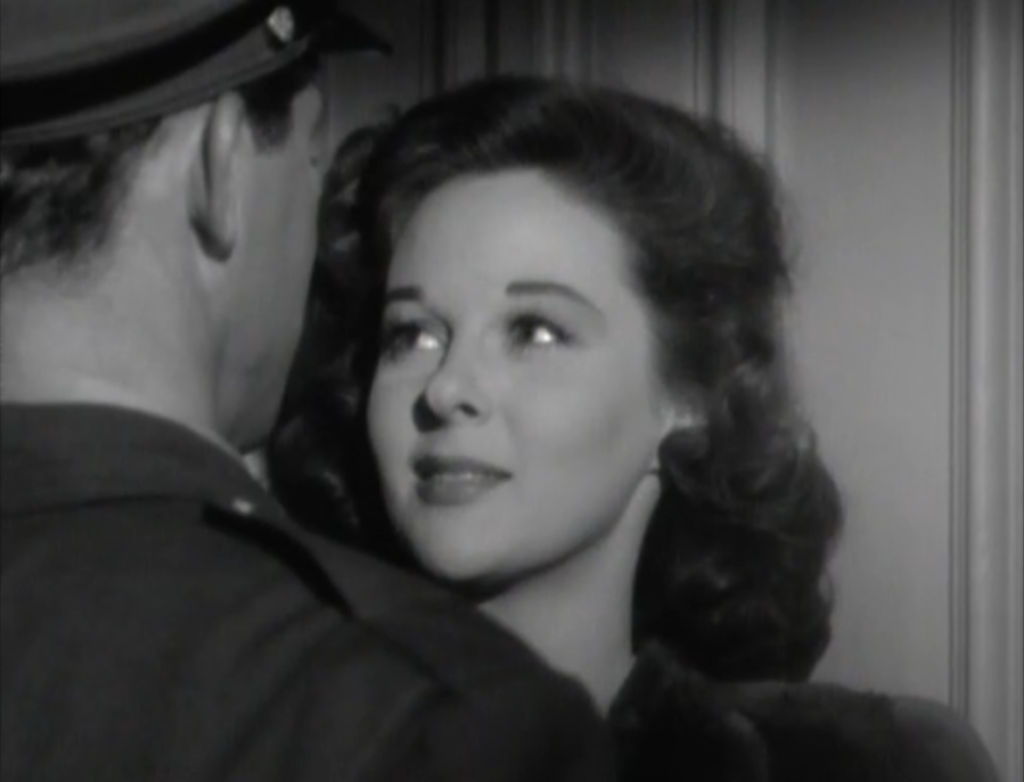|
Genres, Themes, Actors, and Directors:
- Dana Andrews Films
- Flashback Films
- Marital Problems
- Mark Robson Films
- Susan Hayward Films
Review:
My Foolish Heart is perhaps best known as the only authorized film adaptation of any work by J.D. Salinger, who was so deeply distressed by how his short story “Uncle Wiggily in Connecticut” was translated to the screen that he never allowed his cult classic The Catcher in the Rye to be made into a movie. It’s easy to see how a notoriously iconoclastic author like Salinger might take umbrage at this soaper, which was critically lambasted upon its release, and far too often devolves into cliches. Indeed, the film is actually flawed from the get-go, given that Hayward (who, as always, does her best with the material she’s given) is immediately presented to us in such an entirely unflattering light — she drinks too much, takes her beautiful home for granted, and treats her loyal husband like s**t — that we’re never really won over to her side, no matter how “innocent” her past turns out to be.
With that said, the script does possess a surprising number of well-crafted moments — such as the entire initial interaction between Hayward and Andrews the night they meet-cute at a party. Their conversation together afterwards feels surprisingly authentic (not to mention risque); and, once Hayward has left Andrews’ apartment, I like how the camera lingers silently on him, as he eventually walks over to his sink to start washing the pile of dirty dishes Hayward commented on earlier. It all just feels real, in a way Hollywood films of that era seldom do. It’s too bad, then, that the framing narrative of the film is so disappointing — especially the pat denouement, which makes little emotional sense. Salinger did deserve better than that, at least.
Redeeming Qualities and Moments:
- Susan Hayward as Eloise (nominated by Peary as one of the Best Actresses of the Year in his Alternate Oscars)

- An occasionally inspired screenplay by Julius and Philip Epstein
Must See?
No, but it’s recommended for one-time viewing. Listed as a Sleeper in the back of Peary’s book.
Links:
|
One thought on “My Foolish Heart (1949)”
Not a must.
For years, I’d naturally known of Salinger’s distaste for Hollywood due to this film. But, til now, I had not seen it. Now that I have…
The source material is a very, very short story. One could read it in 10+ minutes. It’s not a beautifully written story, particularly, but it has a certain charm and a solid main idea. The way it has been expanded for the screen, in many ways, makes sense – in that, some care was taken to keep liberties in line with the truth of the original story. Unfortunately, overall, the film doesn’t completely work. There’s a good deal of either melodramatic or sappy dialogue (the college life scenes are filled with such annoying sequences as young girls in their dorm rooms all peering out into the hall with “Oh, God, let it be HIM!” looks each time the phone rings) – as if a conscious effort had been made to fit the film to the standards of a sub-par woman’s picture of the period.
Certain parts do work: i.e., the relationship between Hayward and Andrews (who is not bad) is generally satisfying, as is the refreshing bond Hayward has with her father (a fine performance by Robert Keith).
What’s also surprising about the script is that just about all of Salinger’s dialogue is included (most of it taking up the entire opening) – and his material plays better on-screen than it does on the page. (Although I could have done without the overdone repetition of Salinger phrases such as “Poor Uncle Wiggily…” and “I was a nice girl.”)
I did actually come to feel sympathetic toward Hayward – and mostly because of one brief shot. Near the end of the film, a flashback scene reveals how Hayward ‘steals’ her gf’s guy (Smith) – and it’s practically a complete accident. The two are in a secluded spot in his car. Smith declares he’s still in love with her. Hayward briefly looks at the river and we see a quick shot of it. Hayward then comes on to Smith, we’re to believe, because she doesn’t want to kill herself. She doesn’t want to give in to the thoughts of death that have just touched her life so closely – twice. So she does something impulsive to save herself. …And regrets it (and the alteration of her personality) later for quite a long time, which also sends her to dependence on alcohol.
I’m not an overwhelming Hayward fan, tho she does stand out for me in a few films. This isn’t one of them. But she does competent work here.
The film itself is not downright awful (and it’s nicely shot by the terrific Lee Garmes). It tries too hard, though, and we see the strain.